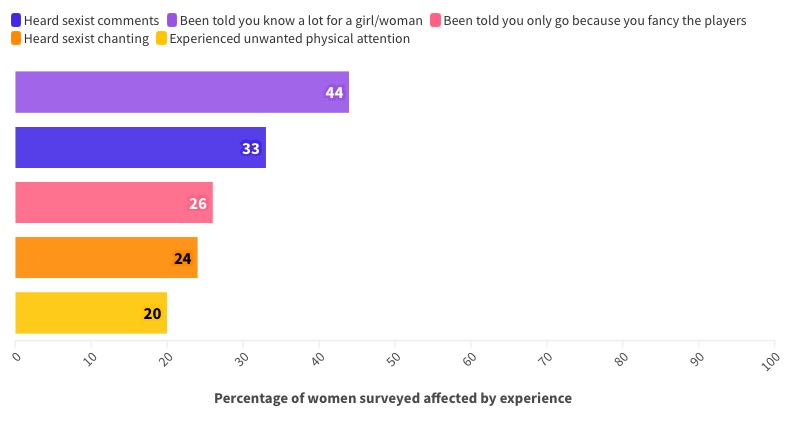If you ask football fans what the difference between going to a men’s game and a women’s game is, you’ll probably get reverberations of:
“Women’s matches are so much friendlier.”
The women’s game is generally perceived to lack the rowdiness and aggressiveness experienced at the men’s.
The boom in popularity of women’s football has seen stadiums such as the Emirates and Stamford Bridge host Women’s Super League (WSL) matches earlier this month to large crowds.
The growth of the WSL, as well as the affection for the England Lionesses, has prompted the question: Why do men’s and women’s games have such different atmospheres?
Who watches which matches?
Women’s football generally attracts a different crowd than its male counterpart.
Spectators are predominantly young women, but men are increasingly attending WSL matches.
Lifelong Arsenal fan Jack Spencer went to his first men’s game at the age of nine.
He shares a season ticket with friends and a trip to the Emirates is always a highlight.
However, in recent years the group has frequently gone to see Arsenal women play.
He said: “If you had told me as a teenager that I would be doing that, I would have laughed in your face.”
A representative for Tottenham Hotspur confirmed that their club had seen an increase this season in the number of season ticket holders who have purchased tickets for both the men’s and women’s matches.
Younger families are also a consistent feature of the crowds at women’s games.
Spencer, 26, said: “It is a far nicer atmosphere at the women’s – more a family day out rather than a beer with the lads.”
The WSL’s marketing towards families is a strategy that plays into both atmospheric and economic considerations.
Regarding the former, with more children present, it means there are fewer drunk people, making for a calmer crowd.
A spokesperson for The Fox and Pheasant, a matchday pub near Stamford Bridge said: “We have noticed a big increase in footie fans attending the womens’ matches.
“It is a really nice atmosphere and certainly less drunken.”
Economically, children are viewed as ‘future season ticket-holders’ by clubs, so getting them interested in football earlier can promise financial longevity.
Why do women prefer to go to watch women’s games?
A 2021 study by the Football Supporters’ Association (FSA) demonstrated that a large proportion of women supporters at men’s games suffered from incidents of sexism.

Ceri Cooper Davies is an avid Arsenal Women’s fan, but grew up watching Queen’s Park Rangers (QPR) men’s team with her dad and brothers.
Even though she still goes to watch QPR, she often feels out of place as a young woman.
She said: “You just feel really looked at.
“And a bit smaller because there is nobody else like you around.”
She is not alone in feeling that way.
The same FSA survey showed that women are five times more likely to start going to a women’s game on their own than they would to a men’s.
It’s statistics like these, as well as fears for women’s safety, that led to women-led supporter groups being set up.
Kate Lewers is the founder of Women of Watford, a collective set up in 2021 to allow female fans of Watford to attend men’s games together.
In the wake of Sarah Everard’s death and the ‘Reclaim These Streets’ movement, Lewers started the group as a walking buddy scheme to make football games safer for women.
She worked in conjunction with Dave Messenger, Watford FC’s Supporter Liaison Officer at the time, to set up the initiative and was blown away by the amount of engagement within the first day.
She said: “The women of Watford wanted to be heard.”
The group now has over 300 Facebook members and 1500 X followers and offers Watford fans who may feel uncomfortable going to matches alone the opportunity to go to matches and pre-game pub trips in a group.
Why are women’s matches calmer?
The family-oriented atmosphere is part of the reason why women’s games tend to be less rowdy.
But there are also important considerations to be made regarding the approach and engagement each gender has to football.
Because of the traditional emphasis on the men’s game in this country, many men are introduced to football at a young age by their families.
They will follow the club that their dad support from childhood until adulthood.
Alternatively, many fans of the women’s game come to it at a later age.
This means that not only are fans of the women’s game of a naturally more mature disposition, but that they also don’t necessarily have an indoctrinated ‘do or die’ attitude to matches in the same way that is expressed at the men’s.
Cooper Davies, 23, said: “If Arsenal ladies lose, it’s peak but my day goes on.
“That’s not so much the experience with men watching men’s games.”
Lewers, 33, similarly said that the women’s matches were not as intense, both in the pre-game pub trips and at the stadium, and that there was a sense of camaraderie between opposing-team supporters.
She explained: “At men’s games it is tribal – almost like a religion.
“People get possessive and protective of their team.
“At a women’s match, if there is a good goal, I will happily turn to the other team’s fans and go ‘I hate you, but good goal!’”
Does there need to be a solution?
Changing entrenched behaviours and overturning traditions is no light work.
It is also difficult to approach the situation without criticising abstract and dangerous overgeneralisations of particular demographics.
It is not fair to blame all men for all incidents of aggressiveness and/or every sexist incident at a football game.
But there are distinct areas which can be used to tackle the issues of safety and comfortable atmospheres.
Initiatives like Her Game Too and Beyond Equality aim to tackle sexism in sport and beyond.
Her Game Too has a ‘report’ function on their website, where people can report any incidents of assault or violence from matches which will then be passed onto relevant clubs and leagues for further investigation if desired.
Beyond Equality (previously Good Lad Initiative) runs workshops in schools, sports teams and workplaces to engage men and boys with gender equality, mental health and what ‘being a man’ actually means today.
Lewers herself often goes into schools to chat to male students men about masculinity, sexual violence and culture.
She believes that the experiences at men’s football matches that pushed her to create Women of Watford can be tackled by how we raise young men to talk about gender.
She said: “It should never be ‘protect your daughter’ – it has to be ‘educate your son.’”





Join the discussion